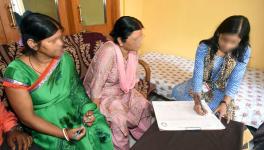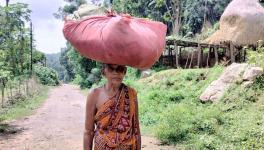Under CM Bal Ashirwad Scheme, MP Govt to pay Rs 2,000 a Month to Covid Distressed Children
Representational use only.Image Courtesy: New Indian Express
Bhopal: Over 6,500 children pushed to starvation by the deadly COVID-19-induced lockdowns have time to rejoice as the Madhya Pradesh government is all set to introduce the CM Bal Ashirwad Scheme - a policy to provide financial support of Rs 2,000 a month to each child.
The Women and Child Development Department of Madhya Pradesh, which has prepared the draft of the policy, identified 6,541 children last year - mostly COVID-19 distressed. In the immediate aftermath of the pandemic, to provide financial assistance to these children, the Department has roped in hundreds of private sponsors such as individuals, organisations, industries and corporates. They provided monthly monetary assistance of Rs 2,000 to 5,565 kids for almost a year. But the donors began to back out owing to their financial constraints.
In Indore alone, which has the highest donors, around 325 children have been awaiting their monthly monetary assistance of Rs 2,000 for the last three months.
The new policy is being introduced to fill the vacuum left by private donors who began to back out, pushing hundreds of children into destitution.
“The upcoming policy does not just support COVID-19 orphans but every kid who is in need of care, including children from the marginalised class, indulge in begging and street children,” said Ashok Shah, Additional Chief Secretary of the Women and Child Development Department. “Parents who can’t look after their children owing to penury would also be covered under the scheme,” he added.
Shah further said that Child Welfare Committees (CWCs) identify, on average, 400 kids every year who need long-term support. “But the number of needy children surged drastically during the COVID-19, and they can’t be left at the mercy of private sponsors as they needed long-term support. The new policy will likely get the government’s nod by next month.”
Thousands of children were identified by the Child Welfare Committee during both COVID-19 waves who either lost their both parents, single parent or livelihood of their parents lost in lockdowns, said Shah. “Over 1,300 such children were covered under Mukhyamantri COVID-19 Bal Kalyan Yojana, over 2000 children were accommodated under ICPC and while a large chunk of children got support under private sponsorship schemes owing to the unavailability of funds and absence of integrated childcare policy.”
This scheme will be separate from the Foster Care programme under the Integrated Child Protection Scheme (ICPS) of the government of India and ‘Mukhyamantri COVID-19 Bal Kalyan Yojana’, though on similar lines.
Under the ICPS scheme, the state gets a 60% grant from the union government to provide family-based sponsorship or foster care to the children in need of care and protection. This support is, however, restricted to 40 children per district. Therefore, in Madhya Pradesh, the cap is at 2040 children per year.
Similarly, the Mukhyamantri Covid Bal Seva Yojana – is a state-level scheme for children orphaned during the first and second waves of COVID-19. Under the scheme, 1,365 kids from the state who lost both parents or guardians to COVID-19 are provided with the financial assistance of Rs 5,000 per month, free ration and support for free education till graduation.
Under the scheme, there is no restriction regarding the number of children from one family who could be benefited, although the ICPS sponsorship and foster care programme have a limit of two kids per family.
The beneficiary kids will be selected through the district-level child welfare committees (CWCs), and the sponsorship amount is used as a priority for providing basic needs like food, clothes, education, and, if required, skill development and employment-oriented training.
The news of the much-awaited policy was also cheered by the child rights activists who welcomed the move but cautioned the government on many points.
Speaking to NewsCick, Archana Sahay, who run a child helpline in Bhopal, pointed out that children need long-term support, good education and care. “Only offering a monthly stipend of Rs 2,000 to children would not be enough. The government should also ensure free education to them under the new policy.”
She further outlined that the new policy has provisions for supporting begging kids and street children. “The attempt to bring street children to mainstream is applaudable, but it will not succeed until we make arrangements for the parents of such children. They always release their children when government agencies or NGOs rescue them and push them into begging.”
“Children have never been on the government’s priority list. Therefore, the allocation of funds is inappropriate. The upcoming policy needed manpower and funds to succeed,” she added.
Get the latest reports & analysis with people's perspective on Protests, movements & deep analytical videos, discussions of the current affairs in your Telegram app. Subscribe to NewsClick's Telegram channel & get Real-Time updates on stories, as they get published on our website.
























